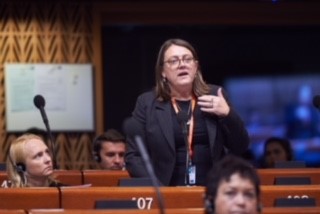By Bryony Rudkin
I’m in the middle of my fieldwork. For some of my fellow students this means travel far and wide, inoculations and visas. For me, it’s sitting at home with a mug of coffee watching webcast council meetings and the greatest danger is missing couriers delivering parcels to my sons. Don’t get me wrong. My curiosity is immense and I am deeply immersed in a series of meetings in two different authorities, my ‘new box sets’ as I call them. One debate brought sentimental tears to my eyes, another had me cringing with embarrassment. Not sure the ethics process quite prepared me for this, but I’m pressing on regardless.
One aspect of this endeavour which I hadn’t considered in detail before has become more of an obsession though. Who else is watching with me and where are they? As I sit here in my spare room in Ipswich, what do those councils make of my repeat viewings of their business? Who is recording my engagement with the process, my location, the time of day (or night) at which I log on? Is this information reported to anyone? Communications officers, councillors, anyone? Wanting answers, I took to the most authoritative source I knew and asked my local government friends on Facebook. Their responses were mixed – some had no idea, some said data was collected but they didn’t think it was reported. One colleague told me to look out for a report to his council in December and another told me 2000 people had watched one particularly fractious Planning Committee meeting. Another friend, not from the sector but with an interest in data, helpfully pointed me to a chapter in his book on the subject.
Useful as these anecdotes were, I needed more, so went looking to see what formal evidence there was on who watches webcasts and where. My first ‘find’ was a church in Tennessee which broadcast a weekend of services and had figures on who had logged on to their website but seemed to want a donation before it would give full detail. My husband told me their algorithms had already captured too much about me from my one visit, so I moved on quickly and struck a small, but rich seam of evidence from Wales. In 2013 the Welsh government had made £1.25m available to local councils for the installation of broadcasting equipment with the aim of improving local democracy and so, according to the then minister responsible, “…members of the public should be able to see how decisions affecting their everyday lives are taken.”
Fast forward a few years and those councils started reporting back on the outcomes. I found several papers submitted to formal meetings of Welsh local authorities and some valuable insights, not least from Torfaen where it was observed that “Webcasting allows people to view meetings at any time of the day or night and wherever they are, whether that be in Pontypool, Cwmbran, Blaenavon or anywhere in the world”. Being conscious of their reach could be significant to a council wanting to know if the cost of the broadcast equipment and platforms on which to publish it was worth it. Not really worth it to the council tax payer to be broadcasting planning applications in Pontypool to Seattle perhaps, but the same paper also observed its own officers were also logging on to watch meetings, with several people watching on the same devices on occasion.
I found reports back to English councils too. The Wirral, for instance, reported in June of this year that there had been some 8753 viewings of its 67 webcast meetings (live and recorded) in 2018/19 and also acknowledged the value of broadcasting meetings with significant public attendance where overspill rooms had to be set up to accommodate all those wanting to see decision making taking place.
My research looks directly at the way councillors behave in meetings, what happens when they make decisions and if knowing they are being recorded doing this makes a difference. Webcasting has made this research easier to carry out, but my interest is now piqued as to who is watching alongside me and I have more contacts to speak to and data to find. If you need me, I’ll be in the spare room watching a screen….
 Bryony Rudkin is a PhD student at INLOGOV, Deputy Leader of Ipswich Borough Council and Portfolio Holder for Culture and Leisure. Bryony also works with councils around the country on behalf of the Local Government Association on sector-led improvement, carrying out peer reviews and delivering training and mentoring support.
Bryony Rudkin is a PhD student at INLOGOV, Deputy Leader of Ipswich Borough Council and Portfolio Holder for Culture and Leisure. Bryony also works with councils around the country on behalf of the Local Government Association on sector-led improvement, carrying out peer reviews and delivering training and mentoring support.
All views in this blog are those of the author and not INLOGOV or the University of Birmingham.